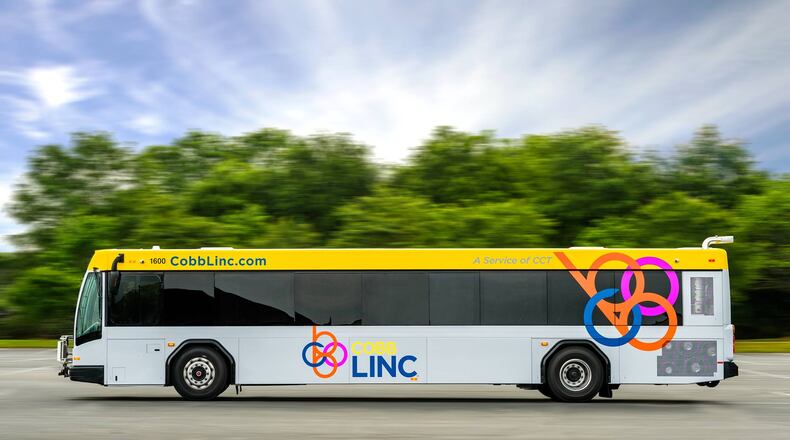The Cobb County Commission now appears poised to approve a ballot referendum in November that would institute a penny sales tax to pay for transit expansion, joining Gwinnett County which took the same action earlier this week.
The Atlanta-region Transit Link Authority approved Cobb County’s proposed transit project list, paving the way for the Board of Commissioners to vote Tuesday on whether to place the transit referendum on the November ballot. It is expected to pass along a party-line vote, with the three Democrats voting in favor and the two Republicans against.
In Gwinnett County, the commission approved its referendum by a party-line 4-1 vote.
Local leaders in both counties are aiming to expand mass transit to the rapidly growing Atlanta suburbs through 30-year penny sales taxes. The proposed projects in both counties include bus rapid transit, on-demand microtransit and expanded local bus routes. Neither includes an expansion of MARTA rail.
The taxes, if approved by voters, would raise an estimated $12.4 billion in Gwinnett and $10.8 billion in Cobb.
Credit: Contributed
Credit: Contributed
Gwinnett’s plans rely more heavily on microtransit and local bus routes, while Cobb has proposed a lofty 108 miles of high-capacity transit with BRT through population centers in the county.
Before giving their unanimous approval to Cobb’s project list Thursday, the Atlanta-region Transit Link Authority board requested ridership projections from the county, which showed average weekday ridership would increase from an estimated 10,400 under the current system to 40,600 in 2050 under the proposed expansion.
The analysis generated by a consulting firm hired by the county relied on pre-COVID methodology and 2020 population estimates and could not take into account ridership estimates for microtransit.
Even though a majority of voters lean Democratic in Cobb and Gwinnett, some have expressed opposition to transit expansion into the suburbs, particularly under a 30-year sales tax. And transit expansion has historically been a tough sell in both counties.
Republican candidate for Cobb County chair Kay Morgan told the authority’s board at their Thursday meeting that “30 years and 11 billion of our tax dollars is just too much of a burden for us to bear.”
Credit: Cobb County
Credit: Cobb County
If it makes it to the ballot in November as expected, the transit tax will be one of a few votes in Cobb County history on transit, while Gwinnett has rejected transit in various forms multiple times in recent years.
Cobb voters weren’t given the option to vote on funding the Metropolitan Atlanta Rapid Transit Authority in 1968 when county officials refused to participate in the metro Atlanta vote. Gwinnett and Clayton counties later followed, foiling plans for a regional transit system.
The city of Atlanta and Fulton and DeKalb counties later approved the referendum to fund MARTA when it came back in 1971 as a Special Purpose Local Option Sales Tax, with Gwinnett and Clayton voting against it. Cobb County again did not participate in the vote.
Decades later in 1987, Cobb voters narrowly approved the creation of the county’s first bus system — the only transit option to which Cobb voters have ever agreed — under Republican Chairman Earl Smith.
Then in 2012, nearly 69% of Cobb voters in the general primary election rejected a 10-county transportation proposal alongside their metro Atlanta neighbors. Gwinnett County rejected it by 71%.
Gwinnett County voters most recently rejected proposals to expand MARTA rail into the county in 2019 and 2020. Leaders blamed the 2019 rejection on low voter turnout and a lingering distrust of MARTA. When voters rejected the 2020 proposal by only 1,013 votes in the general election, some speculated that the pandemic and subsequent economic impacts were to blame.
But this year, Democratic leadership in Cobb and Gwinnett are hoping attitudes about transit have finally changed — and are wagering that county-owned bus rapid transit and on-demand microtransit at the exclusion of MARTA will make a difference.
Transit Advisory Board member Matt Stigall said ahead of Tuesday’s meeting that he’s hoping “voters will finally have the ability to choose if they want better transit.”
The Cobb County Board of Commissioners will vote on the transit tax at its meeting Tuesday at 9 a.m.
About the Author
Keep Reading
The Latest
Featured





